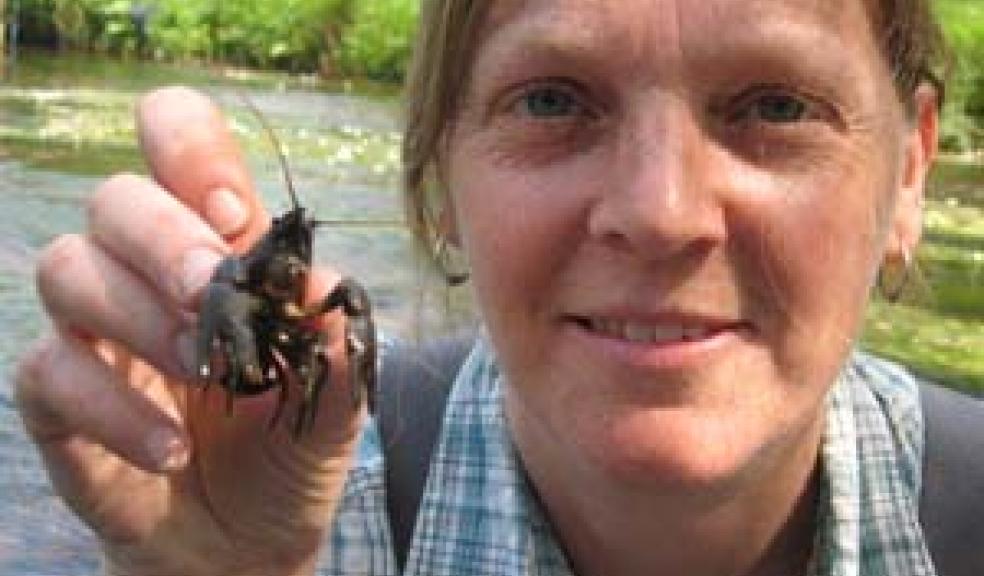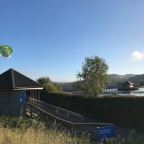
Trust defends Devon species from American invader
A Devon conservation charity is coming to the aid of a native species under threat from its bolder American cousins.
The Whitley Wildlife Conservation Trust, based at Paignton Zoo, has teamed up with the Environment Agency and Buglife – The Invertebrate Conservation Trust to help the white-clawed crayfish.
The white-clawed crayfish (Austropotamobius pallipes) is one of the largest freshwater invertebrates in the UK but is under threat of extinction in the wild because of the introduced American signal crayfish, which out-competes its British counterpart for food and carries a killer plague.
The Whitley Wildlife Conservation Trust UK Conservation Officer, Tracey Hamston, said: “We have a chance to save this species for Devon. The situation is urgent – if it becomes extinct in the county then another small piece of our natural heritage mosaic will be gone. This is a shy, reclusive species that few people know about – but that’s no reason to let it die out.”
The Trust is setting up a public crayfish exhibit at Paignton Zoo and an off-show facility using animals brought from Bristol Zoo. Staff will hone their husbandry skills and develop protocols for caring for the species. In the long-term, crayfish caught under license in Devon rivers will be used to establish a breeding facility at Paignton Zoo with the aim of producing youngsters to be released into secret ark sites in Devon free of the American invaders.
Crayfish reintroductions are carried out by Buglife and the Environment Agency as part of the South West Crayfish Project.
Mary-Rose Lane, of the Environment Agency, said: “Working in partnership with the Whitley Wildlife Conservation Trust and Buglife, we have a very real chance of breeding further generations of crayfish to protect our native Devon populations from extinction. This is a fantastic chance, after 10 years of working in the wild and witnessing their decline due to signal crayfish invasion, to finally secure the future of this species. We are extremely pleased to be able to showcase native crayfish in this way and also give a strong conservation message to the public viewing the living exhibit.”
Andrew Whitehouse, South West Manager at Buglife said: “Devon’s white-clawed crayfish are under severe threat of extinction, if nothing is done they could be gone within five years. This project will enable us to boost the numbers of Devon’s native crayfish and ensure their long-term survival. We are excited about working with the Whitley Wildlife Conservation Trust to introduce one of the UK’s largest, but perhaps most elusive, freshwater invertebrates to Paignton Zoo’s visitors.”
Appropriately, this is the year of the invertebrate at Paignton Zoo. A new exhibit called Investigate – Incredible Invertebrates – opens in the Spring, showing how invertebrates have inspired science and technology.
Mike Bungard, Curator of Lower Vertebrates and Invertebrates at Paignton Zoo, explained: “There are only two rivers left in Devon where you can find this species in the wild and these are kept secret. There are populations elsewhere in England and on the Continent, but the populations in the British Isles represent the greatest concentration of the species in Europe. It is in severe decline throughout this range.”
The white clawed crayfish is protected by law and became recognised as Endangered by the International Union of Conservation of Nature (IUCN) in October 2010. It is a Priority Species in the UK Biodiversity Action Plan. Mike added: “The white-clawed crayfish used to be fairly common in Devon but there have been declines of around 90% in population sizes. We want to help to reverse that decline.”
The species has an important role in the freshwater ecosystem because of what it eats and what in turn eats it. The species is also an important indicator of good water quality. Tracey: “The project fits well with our commitment to native species conservation in the South West.”











